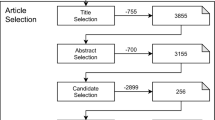Abstract
Stakeholder goals identified during requirements elicitation are usually informal and incomplete statements about a system considered for development. There are numerous approaches for capturing such informal models. For example, we have found the EasyWinWin requirements negotiation method to be an efficient way for attaining consensus among the success-critical stakeholders. The WinWin negotiation model captures stakeholder goals as win conditions, issues, options and agreements. When such a model has to be transformed into more formal representations, quality becomes particularly important. Approaches for validating such informal models can increase quality and provide guidance for further refinement of requirements. Inspection is a proven approach to identify defects and is also applicable to early life cycle artifacts. This paper reports on an empirical study demonstrating the usefulness of an inspection technique for requirements negotiation models. The study employs a conservative economic model, which considers the effect of defect slippage during development on defect detection benefits from inspection. The main finding of the study is that inspection is an economic validation technique for requirements negotiation models. There are, however, certain limitations that need to be studied in more detail.

Similar content being viewed by others
Notes
These documents are available from the authors on request.
References
Boehm BW (1988) A spiral model of software development and enhancement. IEEE Comput 5:61–72
Boehm BW (1996) Anchoring the software process. IEEE Softw 13(4): 73–82
Boehm BW, Egyed A, Kwan J, Port D, Shah A, Madachy RJ (1998) Using the Win Win Spiral model: a case study. IEEE Comput 31(7):33–44
Boehm BW, Bose P, Horowitz E, Lee MJ (1995) Software requirements negotiation and renegotiation aids: a theory-W based spiral approach. In: Proceedings of ICSE 1995. ACM Press, New York
Grünbacher P, Halling M, Biffl St, Kitapci H, Boehm BW (2003) Repeatable quality assurance techniques for requirements negotiations. In: Proceedings HICSS-36, Hawaii International Conference On System Sciences, IEEE Computer Society, 2003
Rule PG (2001) Using measures to understand requirements. In Proceedings of ESCOM 2001, London, 2001, pp 327–335
Kamsties E, Berry DM, Paech B (2001) Detecting ambiguities in requirements documents using inspections. In: Lawford M, Parnas DL (eds) WISE'01: Proceedings of the 1st workshop on inspection in software engineering, Paris, France, July 2001. Software Quality Research Lab, McMaster University, Hamilton, Canada
El Emam K, Madhavji NH (1995) Measuring the success of requirements engineering processes. In: Proceedings of the 2nd IEEE International Symposium on Requirements Engineering, York, 1995
Lauesen S, Vinter O (2001) Preventing requirement defects: an experiment in process improvement. Requirements Eng 6(1):37–50
Macaulay LA (1996) Requirements for requirements engineering techniques. In: Proceedings of the 2nd international conference on requirements engineering (ICRE '96), IEEE Computer Society, 1996
Boehm BW, Grünbacher P, Briggs B (2001) Developing groupware for requirements negotiation: lessons learned. IEEE Softw May/June:46–55
Briggs RO, Grünbacher P (2002) EasyWinWin: managing complexity in requirements negotiation with GSS. In: Proceedings of the Hawaii international conference on system sciences, IEEE Computer Society, 2002
Fagan M (1976) Design and code inspections to reduce errors in program development. IBM Syst J 15(3):182–211
Gilb T, Graham D (1993) Software inspection. Addison-Wesley, Reading, MA
Basili V, Green S, Laitenberger O, Lanubile F, Shull F, Soerumgaard S, Zelkowitz M (1996) The empirical investigation of perspective-based reading. Empirical Softw Eng 1(2):133–164
Laitenberger O (2000) Cost-effective detection of software defects through perspective-based inspections. PhD thesis, University of Kaiserslautern, Germany, May 2000
Laitenberger O, DeBaud J-M (2000) An encompassing life cycle centric survey of software inspection. J Syst Softw 50(1):5–31
Halling M, Biffl St (2001) Using reading techniques to focus inspection performance. In: Proceedings of Euromicro 2001 track on software product and process improvement, Warsaw, September 2001. IEEE Computer Society Press, Los Alamitos, CA
Halling M, Grünbacher P, Biffl St (2001) Tailoring a COTS group support system for software requirements inspection. In: Proceedings of the 16th IEEE international conference on automated software engineering, San Diego, 2001
Grünbacher P, Halling M, Biffl St, Boehm BW, Kitapci H (2002) Formalizing informal stakeholder requirements inputs: the role of inspection. Technical report TR02-10, Dept SE, Technische Universität Wien, 2002. See www.ims.tuwien.ac.at/~biffl
Lamsweerde A van (2001) Goal-oriented requirements engineering: a guided tour. In: 5th IEEE international symposium on requirements engineering (RE'01), tutorial notes, Toronto, August 2001
SEI-CSE workshop on spiral development. http://www.sei.cmu.edu/cbs/spiral2000/february2000/BoehmSR.html
Chernak Y (1996) A statistical approach to the inspection checklist formal synthesis and improvement. IEEE Trans Softw Eng 22(12):866–874
Biffl S, Freimut B, Laitenberger O (2001) Investigating the cost-effectiveness of reinspections in software development. In: Proceedings of ACM/IEEE ICSE 2001, May 2001. IEEE Computer Society Press, Los Alamitos, CA
Basili VR (1993) The experience factory and its relationship to other improvement paradigms. In: Software engineering-ESEC'93, Proceedings. Springer, Berlin Heidelberg New York, pp S68–83
Curtis B (1986) By the way, did anyone study any real programmers? In: Empirical studies of programmers: first workshop. Ablex, Norwood, NJ, pp 256–262
Höst M, Regnell B, Wohlin C (2000) Using students as subjects a comparative study of students and professionals in lead-time impact assessment. Empirical Softw Eng 5:201–214
Tichy W (2001) Hints for reviewing empirical work in software engineering. Empirical Softw Eng 5:309–312
Porter A, Votta L, Basili V (1995) Comparing detection methods for software requirements inspections: a replicated experiment. IEEE Trans Softw Eng 21(6):563–575
Acknowledgements
The authors would like to thank all inspectors participating in the study, all stakeholders taking part in the EasyWinWin negotiations and all graduate students supporting the research team: Martin Weninger, Markus Reiterer, Lorenz Froihofer and Dietmar Winkler. Paul Grünbacher's work on EasyWinWin was supported by the Austrian Science Fund (grant J-1764-INF). Michael Halling has been supported by the Austrian Science Fund (grant P-14128-COSIMIS). Stefan Biffl was funded in part by the Austrian Science Fund (grant J-1948-INF).
Author information
Authors and Affiliations
Corresponding author
Rights and permissions
About this article
Cite this article
Halling, M., Biffl, S. & Grünbacher, P. An economic approach for improving requirements negotiation models with inspection. Requirements Eng 8, 236–247 (2003). https://doi.org/10.1007/s00766-002-0155-8
Received:
Accepted:
Published:
Issue Date:
DOI: https://doi.org/10.1007/s00766-002-0155-8




